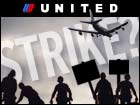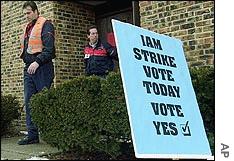|
United mechanics reject pact
|
 |
February 13, 2002: 12:41 p.m. ET
Members say no to 37% pay hike, authorize possible strike Feb. 20.
By Staff Writer Chris Isidore
|
NEW YORK (CNN/Money) - Mechanics at United Airlines early Wednesday rejected a proposed contract that offered them a 37 percent pay raise and approved a strike as soon as Feb. 20.
Both management and the International Association of Machinists (IAM) will go back to the bargaining table on Friday, according to an airline spokesman, in an effort to reach a new agreement without a work stoppage.
There also is a chance that Congress could intervene to impose the terms of the contract proposal that had been recommended by a presidential emergency board appointed by President Bush. The appointment of the board two months ago prevented a strike from taking place then.
"Our negotiators opposed the emergency board's involvement," Scotty Ford, the union's lead negotiator, said. "Their proposals fell short of what we felt we could achieve in direct negotiations. The results of today's vote shows our members agree."
A union spokesman told CNNfn Wednesday there is no timetable for a return to talks but that "obviously it will be quick."

|
|
|
United Airlines mechanics Edward Osmanski, left, and James Taylor leave the IAM office in Des Plaines, Ill., Tuesday after voting to reject the contract and strike. | |
Jack Creighton, CEO of United parent UAL Corp., said the airline is disappointed with the vote but believes an agreement still can be reached in the time remaining before the new strike deadline.
"If progress is made, and there is no reason to believe that it can't be, then we anticipate that another vote will occur by mid-March, without interruption of operations," Creighton said.
But Creighton has said that all the airline's unions need to agree to sacrifices to stem losses at the world's second-largest airline company. Analysts forecast UAL will lose $20.67 a share in 2002, following the loss of $33.23 a share excluding special items it posted in 2001.
UAL (UAL: down $0.31 to $12.08, Research, Estimates) stock sank Wednesday following news of the vote.
The union said 68 percent of 13,000 members voted to reject the proposal, while 86 percent voted to authorize a strike if an agreement cannot be reached in the next week.
Some analysts had questioned whether United parent UAL Corp. could afford the terms of the proposed deal, and that the contract alone could force the airline to seek bankruptcy court protections or at least federal loan guarantees that would require the airline to give up an equity stake in the company to the federal government.
Besides the retroactive and immediate raises that would increase mechanics' salaries by 37 percent to $35.14 an hour, the proposal calls for two additional raises one year and two years after signing that would increase pay another 7 percent to $37.54 an hour.
The emergency board found that the average pay of mechanics at four other major airlines is $31.49 an hour. That pay ranges from $34 an hour at American Airlines, a unit of industry-leading AMR Corp. (AMR: down $0.15 to $24.65, Research, Estimates), to Delta Air Lines (DAL: down $0.44 to $33.10, Research, Estimates), where mechanics are not unionized, which pays $28.76 an hour.
Still, the rejection is no surprise, despite the pay raises included in the emergency board's proposal. The proposal also echoed management's view that concessions are necessary, but said the mechanics should get raises already granted to United pilots and flight attendants before talks of concessions took place. A vote for the proposal was a de facto vote to negotiate concessions.
There also was concern by members about the level of retroactive pay and retirement rates, Merrill Lynch airline analyst Michael Linenberg said. But he said emotion may have been the biggest issue in the vote.
"Any time a contract negotiation drags on for more than a year, the issues tend to be less practical and more emotional," Linenberg said in a note to clients. "We think this is certainly the case here with UAL and its mechanics."
Still, despite the vote, Linenberg believes a strike can be averted. While he concedes that Congress has never imposed a contract settlement with an airline, the risk to the airline's financial health due to a strike are great enough that he says he expects the government will do what it takes to "coerce" all sides to a settlement. "Therefore, we think the probability of a strike is low," he wrote.
"A strike by the mechanics would likely shut down United," he said. "This would obviously not be good for the economy nor shareholders. Bankruptcy could be a probable possibility."
Creighton said on his appointment in October that he did not intend to preside over a bankruptcy.
The IAM, which has a seat on UAL's board, actually helped bring about Creighton's appointment as CEO when it called for the resignation of his predecessor, James Goodwin, after Goodwin suggested in a letter to employees that the company was in a struggle to survive and was, "literally hemorrhaging money." The union praised the appointment of Creighton when the former Weyerhaeuser executive was named to the airline's top post.
|  | |
 |
 |
 |
| |
 IAM's Thomas Buffenbarger says machinists are angry they haven't had a raise since 1994.
IAM's Thomas Buffenbarger says machinists are angry they haven't had a raise since 1994.
| |
 |
United is likely to see deeper first-quarter losses even if there is no strike as fliers stay away from the airline to avoid the risk of being stranded.
"That's hurting United even more, which it can't afford," ABN Amro analyst Ray Neidl said. But he said he doesn't expect to adjust his loss forecast for the period. "The losses are so big already, it's not worth changing," he said.
Neidl also believes an agreement will be reached without a strike.
"In worst case the company caves completely to the union," Neidl said. "The proposal is such a bad contract already for the company that a little bit worse probably isn't a problem," he said. "Then they can concentrate on getting concessions."
Appearing on CNNfn's Before Hours, IAM president Thomas Buffenbarger said his members have heard threats of bankruptcy before.
"Who owns the airline happens to be the employees," he said. "They know where their airline stands, they understand the predicament the carrier is in right now."
Buffenbarger said an agreement can be reached without congressional action, but that his members are angry they have not received a raise since buying the airline in 1994.
Click here for a look at airline stocks
"In all those good years, when United was making billions of dollars, and after the employees sacrificed 14 percent of their wages to buy the airline to save it, no one ever came to them and said, 'We're doing great, ladies and gentlemen, let's share some of that with you,'" Buffenbarger said. "Now our members have eight years of pent-up frustration. They know they've been lagging behind the other carriers and it's time to reach parity."
Besides the mechanics, the IAM also represents about 30,000 customer service personnel, ramp workers and other United employees, who are covered by a separate contract. The union and management also are set to start talks on a new contract for those employees. Together, IAM members at United own about 20 percent of the company's stock through an employee stock ownership plan, so they could be hurt by a bankruptcy filing. 
|
|
|
|
|
|

|

